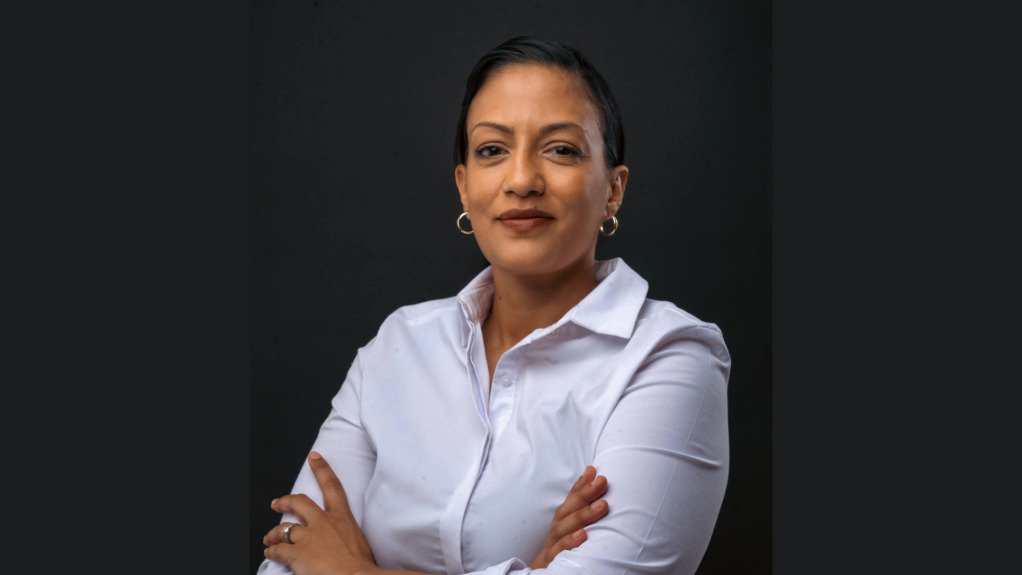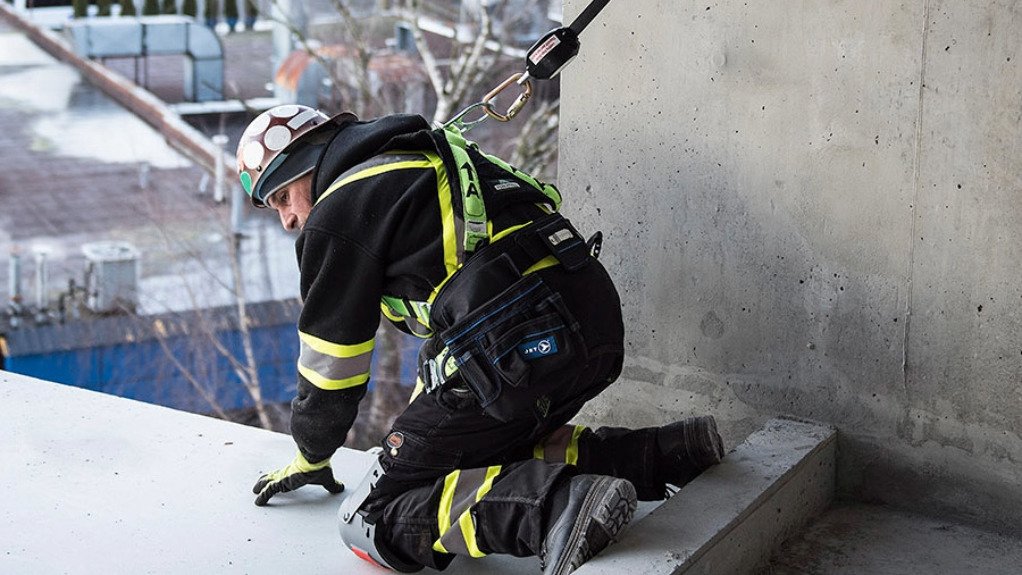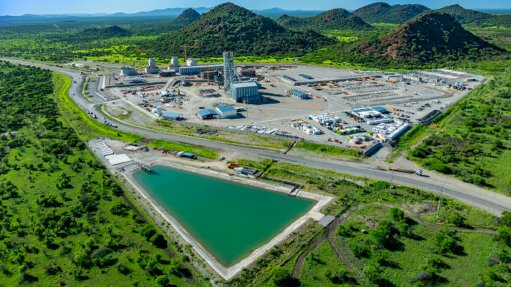Ill-fitted female PPE risks safety, confidence



DESIREE HLUBI Creating inclusive safety gear goes beyond simple size adjustments. It necessitates a deep understanding of women’s specific needs and challenges in the workplace
NOT DESIGNED FOR WOMEN The design of harnesses and other fall protection equipment must be adapted to accommodate women’s bodies, ensuring a proper fit
Despite the growing number of women in industries that are traditionally male-dominated, such as mining, construction and manufacturing, one critical challenge is apparent; the lack of inclusive safety gear designed specifically for female workers, with many grappling with ill-fitting personal protective equipment (PPE) that compromises safety, comfort and confidence.
According to workplace safety solutions provider BBF Safety Group’s Sisi brand manager Desiree Hlubi, the importance of gender-specific PPE in heavy industries must be emphasised.
“PPE serves as the first line of defence, protecting workers from hazardous environments and potential injuries. However, when it fails to fit properly, it can become a liability rather than a safeguard,” Hlubi points out.
She elaborates that, women, with their unique body shapes and clear physiological differences, often find themselves struggling with gear that does not accommodate their needs.
It should be noted that this can lead to discomfort, reduced mobility and a heightened risk of accidents in the workplace.
One significant challenge faced by women in heavy industries is the lack of appropriate breast protection and accommodations in PPE, particularly with fall arrest harnesses.
Hlubi states that “traditional PPE, designed primarily for men, often overlooks this vital aspect, leaving women vulnerable to life-threatening injuries in the event of a fall or impact”
.
Additionally, the weight and distribution of male or “unisex” PPE can be uncomfortable and even dangerous for women with larger breasts.
To address these issues, the design of harnesses and other fall protection equipment must be adapted to accommodate women’s bodies, thereby preventing potential hazards.
According to Hlubi, workwear – such as overalls – should be tailored to the needs of female workers in heavy industries, as women typically have smaller waists, and larger hips and buttocks. This requires garments to have extra fabric to accommodate their body shape.
In addition to breast protection and the accommodation of different body shapes, other factors must be considered when designing PPE for women.
As an example, Hlubi explains that footwear is often designed for men as a default, potentially leading to discomfort and injuries for women with narrower or differently shaped feet.
She stresses that safety footwear that has been specifically designed to better fit women’s feet offers improved comfort and reduced strain on the body.
“For women who spend more than eight hours a day on their feet, companies have a duty to provide the appropriate footwear to achieve the same level of protection afforded to their male counterparts,” emphasises Hlubi.
Further, specialised maternity wear is also a need for women in heavy industries and companies can no longer ignore the risk to pregnant women in the workplace.
Traditional PPE often does not accommodate the unique needs of pregnant women, potentially causing discomfort and health risks. In comparison, maternity workwear is designed to provide a comfortable and safe fit throughout the pregnancy, allowing women to continue with their work without compromising their well-being.
Inclusive PPE
“Creating inclusive safety gear goes beyond simple size adjustments. It necessitates a deep understanding of women’s specific needs and challenges in the workplace,” explains Hlubi.
She adds that the limited availability of PPE designed for women is a critical safety issue that safety and procurement officers must address urgently.
This is a fundamental step in ensuring all workers have suitable protective gear and requires that procurement teams pay urgent attention to addressing the PPE needs of women, while actively seeking out gender-specific options.
At a workplace level where gender-appropriate PPE is not yet available, women workers need to know that they have the right to request that PPE is provided to meet their specific needs, to ensure their safety without compromising comfort or fit.
“By sourcing gender-specific PPE from local manufacturers, companies can empower women by providing them with functional and comfortable equipment that enhances their job performance.”
She notes that inclusive safety gear goes beyond physical protection, it also positively impacts women’s mental well-being.
Additionally, she points out that when workers feel confident and comfortable in their equipment, they are more likely to be engaged, productive and motivated.
“By prioritising the provision of PPE tailored to the unique needs of female workers, companies can significantly improve safety and productivity, showing that such an investment not only benefits individual women but also contributes to a more inclusive and equitable workplace,” Hlubi concludes.
Article Enquiry
Email Article
Save Article
Feedback
To advertise email advertising@creamermedia.co.za or click here
Press Office
Announcements
What's On
Subscribe to improve your user experience...
Option 1 (equivalent of R125 a month):
Receive a weekly copy of Creamer Media's Engineering News & Mining Weekly magazine
(print copy for those in South Africa and e-magazine for those outside of South Africa)
Receive daily email newsletters
Access to full search results
Access archive of magazine back copies
Access to Projects in Progress
Access to ONE Research Report of your choice in PDF format
Option 2 (equivalent of R375 a month):
All benefits from Option 1
PLUS
Access to Creamer Media's Research Channel Africa for ALL Research Reports, in PDF format, on various industrial and mining sectors
including Electricity; Water; Energy Transition; Hydrogen; Roads, Rail and Ports; Coal; Gold; Platinum; Battery Metals; etc.
Already a subscriber?
Forgotten your password?
Receive weekly copy of Creamer Media's Engineering News & Mining Weekly magazine (print copy for those in South Africa and e-magazine for those outside of South Africa)
➕
Recieve daily email newsletters
➕
Access to full search results
➕
Access archive of magazine back copies
➕
Access to Projects in Progress
➕
Access to ONE Research Report of your choice in PDF format
RESEARCH CHANNEL AFRICA
R4500 (equivalent of R375 a month)
SUBSCRIBEAll benefits from Option 1
➕
Access to Creamer Media's Research Channel Africa for ALL Research Reports on various industrial and mining sectors, in PDF format, including on:
Electricity
➕
Water
➕
Energy Transition
➕
Hydrogen
➕
Roads, Rail and Ports
➕
Coal
➕
Gold
➕
Platinum
➕
Battery Metals
➕
etc.
Receive all benefits from Option 1 or Option 2 delivered to numerous people at your company
➕
Multiple User names and Passwords for simultaneous log-ins
➕
Intranet integration access to all in your organisation


















